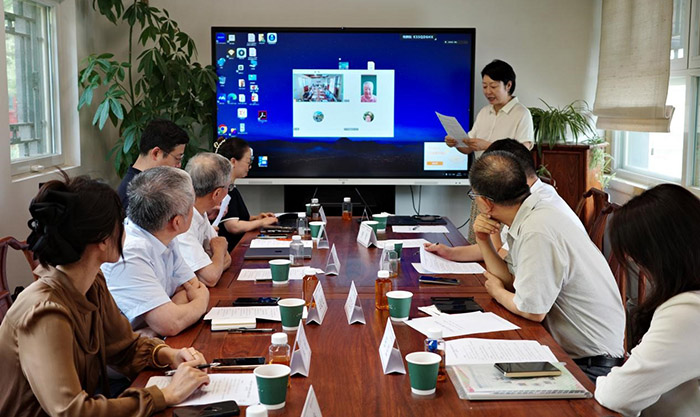Leaders of the All-China Environment Federation Attend Expert Seminar on Overseas Sustainable Development of Chinese Enterprises to Explore New ESG Strategy Paradigms
On July 1, 2025, the “Expert Seminar on Overseas Sustainable Development of Chinese Enterprises,” co-hosted by the National School of Development at Peking University and the Beijing Rongzhi Institute of Corporate Social Responsibility, was successfully held in Beijing. Mr. Tu Ruihe, Vice Chairman of the All-China Environment Federation (ACEF), was invited to attend and deliver a keynote speech, while Mr. Shi Xiang, Secretary-General of the Belt and Road Committee, participated in the thematic discussion.
As an important academic activity of the research project “Overseas Sustainable Development of Chinese Enterprises,” the seminar brought together experts and scholars from fields such as regional and country studies, international trade and economic cooperation, international economic ethics, ESG, and sustainable development. Industry representatives from companies such as State Grid International Development Co., Ltd. and Fujifilm Manufacturing (Shenzhen) Co., Ltd. also participated. The discussions centered on the project's findings and the ESG strategy practices of Chinese enterprises operating abroad

During his speech, Vice Chairman Tu emphasized the importance of establishing a systematic risk management framework for Chinese enterprises in the process of 'going global.' He highlighted three core competencies that need to be strengthened under the complex and evolving international environment:
First, strengthening risk early warning and long-term prevention mechanisms. Enterprises operating overseas face multidimensional risks—political, environmental, and social. A full-cycle, dynamic risk assessment system must be developed, integrating ESG factors into the forefront of investment decisions to achieve a strategic shift from passive response to proactive risk prevention.
Second, enhancing emergency response capabilities for unexpected incidents. In light of potential environmental accidents or community conflicts in overseas operations, standardized emergency plans should be established. Continuous optimization of response processes through scenario simulations and stress testing can minimize negative impacts.
Third, improving brand reputation management strategies. Enterprises should establish professional public opinion monitoring and crisis communication systems. Through transparent communication and stakeholder engagement mechanisms, potential disputes can be defused in a timely manner, avoiding irreversible damage to the company's international image.
During the discussion session, Secretary-General Shi Xiang elaborated on the unique value and practical approaches of social organizations in promoting people-to-people connectivity. He emphasized that as a vital bridge connecting governments, enterprises, and communities, environmental NGOs play an irreplaceable role in soft connectivity under the Belt and Road Initiative. By building multi-stakeholder dialogue mechanisms and localizing environmentally friendly projects, such organizations help resolve potential conflicts from cultural differences and foster deeper integration of corporate social responsibility with local development needs. This in turn contributes to building a sustainable international business ecosystem.
Shi further stressed that in the new pattern of globalization, corporate 'going global' strategies should develop closer synergy with social organizations. By leveraging complementary advantages and sharing resources, both sides can explore development models suited to host countries, achieving a harmonious unity of economic benefits and social value.
This seminar focused on the strategic upgrading needs faced by Chinese enterprises in their overseas expansion and reached three major consensuses:
Overcoming the challenges of going global and building a new paradigm of ESG strategic synergy
In the current complex and ever-changing international geopolitical environment, Chinese enterprises face new opportunities and challenges in expanding abroad. Experts pointed out that outbound strategies should align the host country's development goals with the dynamics of the company’s global commercial strategy, creating a three-dimensional resonance of 'policy-industry-people-to-people connectivity.'
As the global sustainable development agenda deepens, this model—which balances national strategy, commercial value, and people-to-people connectivity—will become a core advantage in enhancing the international competitiveness of Chinese enterprises. This model has already demonstrated replicable success in key sectors such as energy, mining, and infrastructure, providing practical ESG templates and strategic frameworks for high-quality overseas expansion.
Optimizing outbound strategies and creating a new ESG management engine
Corporate ESG practices are undergoing a systematic shift from conceptual frameworks to methodological systems. On the management tools level, intelligent decision-making platforms provide dynamic ESG support for multinational enterprises through features such as geopolitical risk assessments and carbon footprint tracking, significantly improving supply chain transparency and risk forecasting capabilities.
At the management systems level, leading companies achieve visualized and continuously improving ESG performance through regular diagnostics and dynamic monitoring. Enterprises using such systems often see significant improvement in their ESG ratings.
In terms of compliance management, innovative frameworks transform international standards into implementable business processes, effectively addressing challenges in localizing foreign regulations. This greatly improves compliance efficiency and offers a viable path for digital transformation.
Most importantly, multi-stakeholder governance is emerging as an innovative ESG risk management paradigm. By establishing governance models involving enterprises, international organizations, and local communities, companies not only mitigate environmental and social risks but also advance ESG practices from passive compliance to proactive value creation. This transformation marks a more mature stage of ESG management among Chinese enterprises.
Achieving enterprise value enhancement and opening new paths for ESG brand premium
Chinese companies are pioneering new paths in the global value chain through innovative ESG practices that synergize business, social, and environmental values. Recent practices demonstrate that deeply integrating ESG concepts into corporate strategy not only generates brand premium but also creates new profit growth drivers through ESG products, carbon asset management, green financing, and community development.
Leading enterprises have established a 'business-society-environment' trinity value creation model, which is shaping a new competitive advantage in global markets. As ESG standards continue to mature, Chinese companies' innovative practices have shifted from being cost centers to value engines. By exporting sustainable business models, they are offering replicable Chinese solutions for the reconstruction of global value chains, demonstrating a new development path that balances economic, social, and environmental benefits.

This seminar provided important practical insights for the 'Overseas Sustainable Development of Chinese Enterprises' research project. Moving forward, the All-China Environment Federation will deepen collaboration with academia and industry to jointly promote the capacity-building of Chinese enterprises in sustainable overseas development. The federation aims to help build a China-smart ESG framework and contribute to the achievement of global sustainable development goals.
 Scan and Follow Us
Scan and Follow Us

